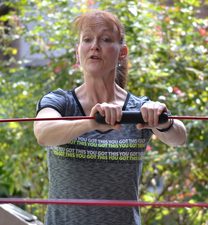November is the official month for promoting awareness of diabetes, both ways to live with and prevent it. When it comes to diabetes, many of the discussions naturally center around nutrition, but exercise is another important component that can be overlooked.
I’m sure we’re all tired of hearing the importance of exercising. We know it  lowers risk of many chronic conditions including heart disease, diabetes, and high blood pressure among a few. We know it increases endorphins in our brain that make us happier. We know that stronger muscles relieve some joint pain and improve function. We also know that the more you do, generally, the better off you are.
lowers risk of many chronic conditions including heart disease, diabetes, and high blood pressure among a few. We know it increases endorphins in our brain that make us happier. We know that stronger muscles relieve some joint pain and improve function. We also know that the more you do, generally, the better off you are.
 lowers risk of many chronic conditions including heart disease, diabetes, and high blood pressure among a few. We know it increases endorphins in our brain that make us happier. We know that stronger muscles relieve some joint pain and improve function. We also know that the more you do, generally, the better off you are.
lowers risk of many chronic conditions including heart disease, diabetes, and high blood pressure among a few. We know it increases endorphins in our brain that make us happier. We know that stronger muscles relieve some joint pain and improve function. We also know that the more you do, generally, the better off you are.Those with diabetes are even more aware of the importance of exercise to help lower blood sugar. Managing diabetes is all about balance. Proteins and carbohydrates need to be balanced. Medications need to be balanced. Exercise needs to be balanced, too.
We are learning more and more about how important exercise really is. Or to put it in another way, we are learning more and more about how dangerous inactivity really is. Not moving enough can make you resistant to insulin! There are more compelling (and scientific) reasons to keep moving.
So what do we do? First, I think we’d all be better off if we think of activity as medicine. It’s something we have to take (or do) regularly, like medicine. I have a few suggestions to help take your “medicine.”
- Break it up throughout the day. Take a little walk around the block every hour or two. Make an effort to go up and down the stairs a few times in a row every hour or two. It’s better to move a bit all day long than sit all day and hit the gym hard for an hour.
- Don’t try to find the “magic parking spot." You’ll gain steps and time by driving around a parking lot if you just purposefully park far away.
- Keep a resistance band near the couch. Learn how to do some strengthening exercises while you’re watching TV. If the resistance band (or soup cans or dumbbells) is within reach all the time, you’ll be more likely to use it.
- Unload the groceries slowly. Don’t try to overload yourself by carrying everything in all at once. Take your time on purpose, one bag at a time.
- Practice balance.Use the time when you’re in line at the store or brushing your teeth to work on balance exercises. Do heel raises and stand on one leg to keep yourself balanced.
Eating well is, of course, important to maintaining good health; but exercising with proper nutrition is a perfect balance.






Leave A Comment
You must be logged in to post a comment.